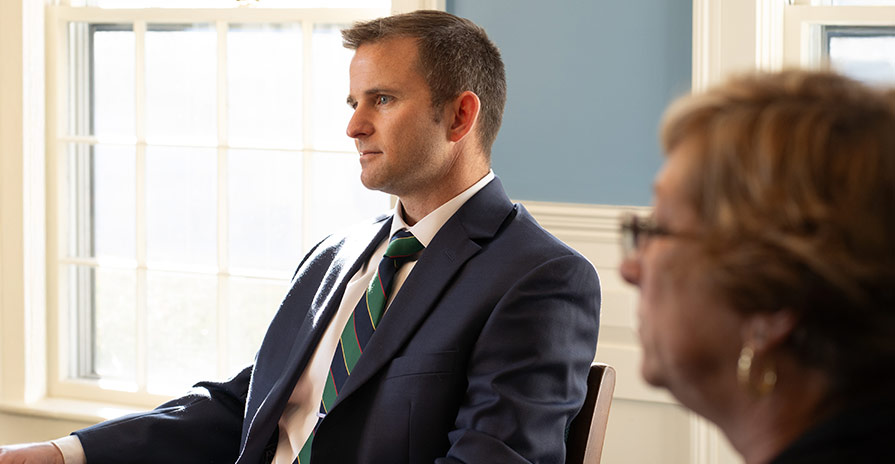Probate
and Trust Administration Lawyer in Amherst, New Hampshire
Probate and Trust Administration Lawyer in Amherst, New Hampshire
Guiding You Through the Process
At Sowerby & Moustakis Law, we’re here to provide clear, compassionate guidance to help you through this difficult time. Whether you’re an executor, trustee, or beneficiary, we’re committed to ensuring the process goes smoothly and that your loved one’s wishes are honored.

Understanding Probate and Trust Administration
Probate and trust administration are the legal processes used to manage and distribute a deceased person’s estate. These processes ensure that debts are paid, assets are distributed according to the decedent’s wishes, and any legal requirements are met.
Probate Administration
Probate is the court-supervised process of validating a will, paying debts and taxes, and distributing the remaining assets to the beneficiaries. If the deceased did not have a will, probate is used to distribute assets according to state law. The probate process can be complex and time-consuming, but it’s essential to ensure that the estate is settled properly.
Trust Administration
Trust administration involves managing and distributing assets held in a trust according to the terms set forth by the grantor (the person who created the trust). Unlike probate, trust administration is typically handled outside of court, which can make the process faster and more private. However, it still requires careful attention to legal details to ensure the trust is administered correctly, especially when there are assets to be held in trust for an extended period.


“We highly recommend Sowerby & Moustakis Law. Complementing his extensive knowledge with an individualized approach, Peter Moustakis offers wise counsel.”
- PATRICE P.
Key Responsibilities in Probate Administration
When handling probate administration, the executor has several crucial responsibilities to ensure the estate is managed and distributed according to the deceased's wishes and in compliance with legal requirements.
Identifying and
Valuing Assets

This includes real estate, bank accounts, investments, personal belongings, and any other valuable property. Each asset must be carefully documented and assessed to determine its current market value. This step is vital for understanding the estate's total worth and ensuring accurate distribution to beneficiaries.
Paying Debts and Taxes

Before any assets can be distributed to beneficiaries, the executor must address the deceased’s outstanding debts and taxes. This includes paying off credit card balances, mortgages, loans, and any final medical bills. The executor must file the deceased’s final income tax returns and pay any estate taxes that may be due. This step ensures that the estate is clear of financial obligations, protecting beneficiaries from potential future claims.
Distributing Assets

After debts and taxes have been settled, the remaining assets can be distributed according to the terms of the will. The executor is responsible for ensuring that each beneficiary receives their designated inheritance, whether it be cash, property, or other valuables. This process requires careful attention to detail to ensure the decedent's wishes are fully honored and that all legal procedures are correctly followed.
Identifying and Valuing Assets

This includes real estate, bank accounts, investments, personal belongings, and any other valuable property. Each asset must be carefully documented and assessed to determine its current market value. This step is vital for understanding the estate's total worth and ensuring accurate distribution to beneficiaries.
Paying Debts and Taxes

Before any assets can be distributed to beneficiaries, the executor must address the deceased’s outstanding debts and taxes. This includes paying off credit card balances, mortgages, loans, and any final medical bills. The executor must file the deceased’s final income tax returns and pay any estate taxes that may be due. This step ensures that the estate is clear of financial obligations, protecting beneficiaries from potential future claims.
Distributing Assets

After debts and taxes have been settled, the remaining assets can be distributed according to the terms of the will. The executor is responsible for ensuring that each beneficiary receives their designated inheritance, whether it be cash, property, or other valuables. This process requires careful attention to detail to ensure the decedent's wishes are fully honored and that all legal procedures are correctly followed.
Key Responsibilities in Trust Administration
Trust administration involves managing and overseeing a trust’s assets according to the terms set by the grantor. This process becomes especially important when the trust is designed to last for years or even decades after the grantor's death. The trustee, who administers the trust, has several key duties:
Managing and
Growing Trust Assets

One of the trustee's primary responsibilities is to manage the trust’s assets in a way that preserves and grows their value. This can include investing funds, managing real estate, or overseeing business interests held within the trust. The trustee must act prudently and in the best interest of the beneficiaries, making decisions that align with the trust’s goals and terms.
Distributing Income
and Principal

Depending on the trust's instructions, the trustee may need to distribute income generated by the trust’s assets to beneficiaries on a regular basis. The trustee must also manage requests for distributions of the trust’s principal, ensuring that these distributions are made according to the grantor’s wishes and the trust's terms. This requires a careful balancing of the needs of current beneficiaries with the long-term goals of the trust.
Managing and Growing Trust Assets

One of the trustee's primary responsibilities is to manage the trust’s assets in a way that preserves and grows their value. This can include investing funds, managing real estate, or overseeing business interests held within the trust. The trustee must act prudently and in the best interest of the beneficiaries, making decisions that align with the trust’s goals and terms.
Distributing Income and Principal

Depending on the trust's instructions, the trustee may need to distribute income generated by the trust’s assets to beneficiaries on a regular basis. The trustee must also manage requests for distributions of the trust’s principal, ensuring that these distributions are made according to the grantor’s wishes and the trust's terms. This requires a careful balancing of the needs of current beneficiaries with the long-term goals of the trust.
Maintaining Records
and Reporting

The trustee is responsible for keeping detailed records of all trust activities, including income, expenses, distributions, and investments. This documentation is essential for providing regular reports to beneficiaries and for tax purposes. Trustees must ensure that all tax filings related to the trust are completed accurately and on time, and they may need to work with accountants or financial advisors to manage the trust’s tax obligations.
Addressing
Beneficiary Concerns

Trustees often serve as the point of contact for beneficiaries who have questions or concerns about the trust. This includes communicating the status of the trust, explaining the trustee’s decisions, and addressing any disputes or issues that may arise. A trustee must be impartial, transparent, and responsive to the needs of all beneficiaries.
Maintaining Records and Reporting

The trustee is responsible for keeping detailed records of all trust activities, including income, expenses, distributions, and investments. This documentation is essential for providing regular reports to beneficiaries and for tax purposes. Trustees must ensure that all tax filings related to the trust are completed accurately and on time, and they may need to work with accountants or financial advisors to manage the trust’s tax obligations.
Addressing Beneficiary Concerns

Trustees often serve as the point of contact for beneficiaries who have questions or concerns about the trust. This includes communicating the status of the trust, explaining the trustee’s decisions, and addressing any disputes or issues that may arise. A trustee must be impartial, transparent, and responsive to the needs
of all beneficiaries.

“Easy to work with and they explain everything in understandable words.”
- OLIVER H.
Frequently Asked Questions
Probate and Trust Administration

How long does probate take?
Probate can take anywhere from a few months to over a year, depending on the complexity of the estate and whether any disputes arise. We’ll help you navigate the process as efficiently as possible.

Do all estates have to go through probate?
Not necessarily. Some assets, like those held in a trust or jointly owned property, may pass directly to beneficiaries without going through probate. We’ll help you determine what’s required for your situation.

What happens if there’s no will?
If there’s no will, the estate is distributed according to state law, which typically prioritizes spouses and children. We’ll guide you through the process to ensure that the estate is handled properly.
Frequently Asked Questions
Probate and Trust Administration
How long does probate take?
Probate can take anywhere from a few months to over a year, depending on the complexity of the estate and whether any disputes arise. We’ll help you navigate the process as efficiently as possible.
Do all estates have to go through probate?
Not necessarily. Some assets, like those held in a trust or jointly owned property, may pass directly to beneficiaries without going through probate. We’ll help you determine what’s required for your situation.
What happens if there’s no will?
If there’s no will, the estate is distributed according to state law, which typically prioritizes spouses and children. We’ll guide you through the process to ensure that the estate is handled properly.

